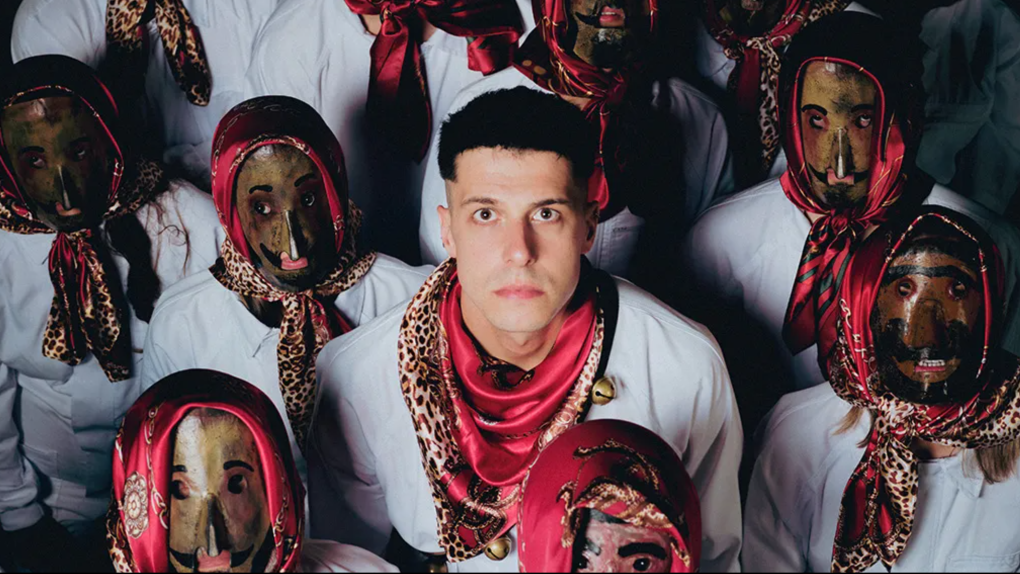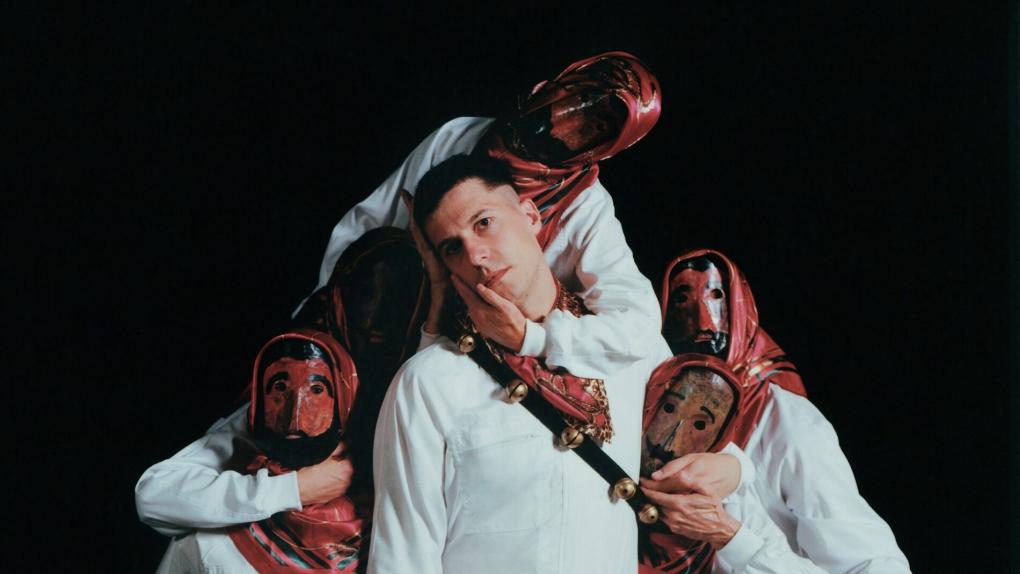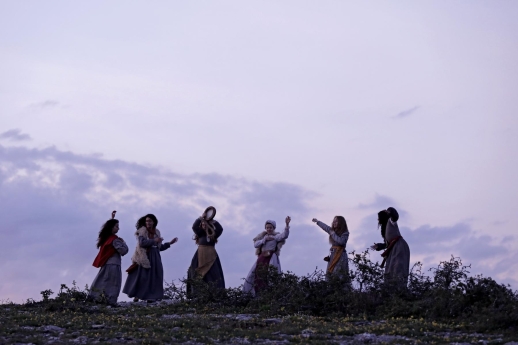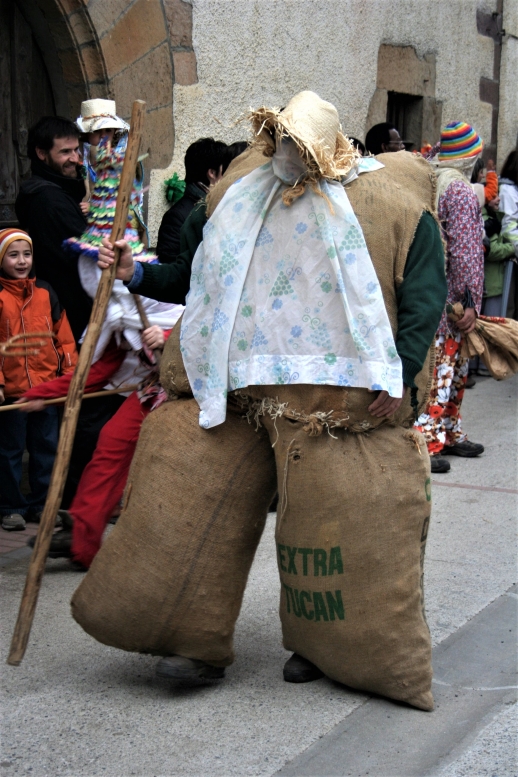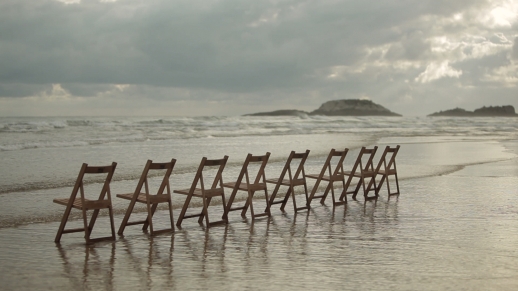Pello Reparaz´s musical project has emerged as the most popular band in the Basque Country, driven by an ever-evolving creative vision.
Zetak, pop phenomenon: Euskara, Basque mythology and artistic avant-garde
Last updated on 15 Sep 2025The million-dollar question
“Why? What’s all the fuss about Zetak? Trips, interviews, thousands upon thousands of people at concerts, electronic music, Basque mythology… Zetak´s creative proposal is solid, and one aspect truly stands out above them all: the Basque language”. The documentary ‘Zetak, hau ez da kontzertu bat’ (Zetak, this is not just a concert), premiered at the end of last year on Basque public television network, ETB 1. It offers insights into the musical, artistic, and personal universe of Pello Reparaz, currently the most talked-about artist in the Basque Country´s music industry. His cultural and social impact is undeniable.
The phenomenon has snowballed in recent months. Nobody who knows anything about Basque music has the slightest doubt that Zetak, the collective project led by Reparaz, has become something big. Very big. Giant at times, especially in their ambitious live performances. Zetak drew 30,000 fans to the Navarra Arena in Pamplona on two consecutive evenings, an event that 275,000 viewers watched on ETB 2 on Saturday 3 January. The tour to promote their most recent album, ‘Aaztiyen’ (2023), wrapped up with three concerts on 5, 6 and 7 September in San Sebastian’s multi-purpose venue Illunbe. Another resounding success. The show ‘Mitoaroa II’ gathered 40,000 spectators, 150 performers and 350 technicians to the city.
The third of their now legendary gatherings will take place on 19 and 20 July 2026 at Bilbao´s San Mamés Stadium. No international artist or band has ever performed two days in a row at the so-called ´cathedral of football´. The first 40,000 tickets sold out in three hours. Demand has once again been phenomenal, and on 11 September, Reparaz announced a second concert at the same venue on his Instagram account: “San Mamés: for the first time in history, a Basque project has filled a stadium in Euskara. You´ve sold out the pre-sale tickets, we can´t believe it. We don´t want to leave anyone out, so we´ve decided to announce another date”.
It´s still not known whether this will be the final stop on this triumphant mini-tour of Basque capital cities. In theory, the musician from Arbizu, Navarra, still has to tick the boxes for Vitoria - Gasteiz and Baiona. Reparaz, a 35-year-old musician, launched Zetak in 2019 to explore new sounds. Six years later, the band is flying high. They are the band to be seen with and heard with. Why? The story of Zetak´s artistic and commercial explosion begins with a question.

About how the guy with the trombone in Vendetta became Zetak
The imagination, madness and daring of Pello Reparaz first took shape in a group marked by the winds and rhythms of ska music. The Navarrese band Vendetta, which rose from the ashes of Skalariak, a pivotal group for understanding the roots of Jamaican music in the Basque Country, was active for a decade, releasing five albums from 2008 to 2018. Reparaz, the band’s young vocalist, also played the trombone. When Vendetta said goodbye to the stage at their final concert in Atarrabia, Navarra, they left thousands of fans orphaned. The live EP ‘Agur Vendetta’ (2018) was the grand finale of a vibrant group with commercial appeal.
Vendetta also had a more emotional side that Reparaz would skilfully exploit over the next decade. ‘Ekainak 24’, from the 2012 album ‘Fuimos, somos y seremos’, came eight years before the captivating ballad ‘Zeinen ederra izango den’, one of the most memorable songs from Zetak´s early years. The lyrics, full of nostalgia and poetic imagery, refer to a date as meaningful as the night of San Juan: ‘Ekainak 24, gabon. Herrian zer berri? / Neurea malkoz busti ta zeuena egin.’ (‘24th of June, good evening. What´s new in the village? / My melancholy spills over and yours follows suit.’)
Without the band that supported him, the transformation that eventually led to his stardom may not have occurred. Or maybe it would have happened differently. The funny thing is that, despite Zetak´s music being a completely different style – much more expansive and cool than its predecessor – there are certain similarities between the two projects. When asked by the music magazine MondoSonoro how he felt about his time in Vendetta, Reparaz looked back at the ska band: “It was my school. It´s where I learned everything. It´s what gave a 17-year-old trombonist the opportunity to dedicate himself to what he loved most. And still today I earn my living writing and playing songs.”
Forging a path of their own
Taking careful note of what their contemporaries are up to on world pop scene (the epic of Coldplay, the expansive electronica of Moderat, the retro fantasy of M83, the ability to surprise of Rosalía), but tapping deep into their Navarrese roots, Zetak have always marked their own beat. They have been doing so since their debut single ‘Errepidean’, released in the summer of 2019, which paved the way for the album of the same name launched at the end of that year. The tour found the group in the midst of the pandemic, yet the new musical elements resonated with their fans. Zetak´s first LP tour sold out to capacity crowds of 400, 500, and even 900 people. In the summer of 2020, despite some shows being cancelled because of the health crisis, Reparaz was thrilled with the public´s reception: “Not even in my wildest dreams could I have imagined a launch like Zetak´s,” he said.
Zetak´s albums are like experiments in the laboratory of Pello Reparaz, the heart and soul of a project he shares with musicians Gorka Pastor, Leire Colomo and Iban Larreburu. The second album, ‘Zeinen ederra izango den’, was released just a year later. The Gaztea Sariak 2020 awards, organised by the popular radio station Gaztea, broadcast by EITB (Basque public radio and television), crowned Zetak as the most important group in the Basque Country by giving them the most awards, including best band and best live performance. Zetak not only assimilate and integrate new trends but also fuse them with a unique language rich in local references. ‘Akelarretan’, for example, a track from their second album, refers to the covens, the supposed rituals in which Basque witches would gather the early 17th century to perform their spells and worship Satan.
Each step has been key in Zetak´s climb to stardom. In 2022, the group teamed up with seasoned vocalist Erramun Martikorena for the official song of Herri Urrats, the festival of the ikastolas (Basque-language schools) of Iparralde (the Northern Basque Country, that lies entirely within France) that takes place every year on the lake of Senpere. ‘Itzulera’ is a euphoric anthem, and to date, has accumulated over four million views on YouTube. Despite the fact that the ten most popular songs on Spotify have over a million plays, Zetak has revolutionised Basque music without the need for a hit single. What propelled them to fame was an unshakeable belief in a dynamic project that has embraced pop from different perspectives.
‘Hileta Kantu Nafarra’, for example, is another take on their catchy electronic music. Released in December 2024, the single features the vocal accompaniment of amateur singer Maixux Zugarramurdi and addresses the theme of losing a loved one from a relatable perspective. Bathed in synthesizers, the song is a kind of emotional catharsis shared by both performers. Reparaz´s grandfather had recently passed away, while Zugarramurdi, aged 70, had also said goodbye to her husband after a long illness. ‘Hileta Kantu Nafarra’ is a farewell that embodies Zetak´s mourning, with the introduction of the Basque mythological character Herio symbolising death. “Agur. / Asko nuen esateko. / Asko zuri emateko. / Agur. / Arakiletik dator Herio behar baino lehenago (“Goodbye / I had so much to tell you / So much to give you / Death appears on the Arakil River sooner than expected”).
A mythological coven
Zetak´s roller coaster has only picked up speed since 2023. In their tireless quest for the project´s artistic identity, the fusion of electronic rhythms with Basque roots takes on a new dimension in ‘Aaztiyen,’ their third and latest album. The syncopated beats of the txalaparta had already appeared in their music as a symbol of ancestral Basque culture. However, Zetak´s most locally-rooted album has also marked the culmination of a journey in which they embrace native mythological imagination and weave a fantastical narrative.
Reparaz constructs his career as he sees fit – no shortcuts or gimmicky tricks. While the music industry thrives on singles and the shock value of social media, he has crafted a concept album where the collective experience is more important than the individuality of the songs. “Over the last two years I’ve set out to find a voice, which is why I’ve been more introspective,” the Navarrese musician confessed during the media presentation of ‘Aaztiyen’, a term that means ‘recently’ in the dialect of his village. “Now I feel like a successful person because I believe I have composed an album that could only have been created in Arbizu.”
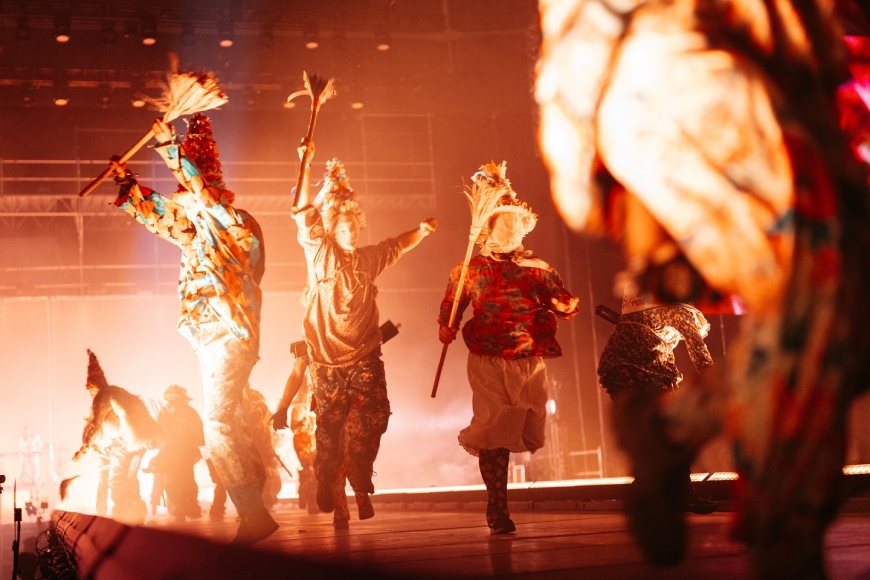
Zetak´s moment reflects a band eager to conquer the world now more than ever before. The intergenerational bath of humanity at the local festivities in the Basque capitals in 2023 was a harbinger of what was to come. Songs like ‘Hitzeman’, ‘Zeinen ederra izango den’, ‘Errepidean’ and ‘Itzulera’ are now part of the soundtrack of children, young people, the elderly and entire families. The massive show ‘Mitoaroa’ at the Navarra Arena went far beyond the experience of attending a live music concert. His feat can be revisited on the EITB website. There you have it: a cocktail of music, carnival, Basque mythology, electronic rhythms and sing-along refrains that have left thousands of people speechless. ‘A cross between mythology and the characters of the Navarrese carnival,’ Reparaz sums up. But, deep down, it´s clear that the defining factor is the Basque language. ‘The language is what gives the project credibility,’ he says.
I don´t know if the success of Zetak – at least by my personal definition of success – can be attributed to a single factor, but I’m convinced that the Basque language is a key element, as I can clearly see the interest it generates.
The strength of Euskara
This is the most important piece of the sonic, visual and conceptual puzzle that defines Zetak, the common thread. Without the Basque language, the puzzle would be incomplete; it wouldn’t. the driving force that has allowed Pello Reparaz to emerge as an artistic figure who evolves at an astonishing speed. On this journey through different stylistic registers, the Basque language is almost the only non-negotiable issue in Zetak. It is the backbone of his identity. And no, contrary to what is often claimed in certain circles about minority languages, it has not hindered his musical career; on the contrary. “Singing in Basque opens more doors for me than it closes. Few people understand it, but it works and sparks interest,” Reparaz told the Catalan newspaper La Vanguardia in 2024.
Following his reggaeton collaboration with the Colombian alternative dance group Bomba Stereo on the song ‘Zoriontasuna (Life is for real)’, he was interviewed by the Mexican newspaper La Jornada. Euskara, Reparaz pointed out, is also his way of doing politics and spreading Basque culture throughout the world. “Opting for such a small language, and speaking Spanish, as is my case, and English too, for example, is still a political decision. Also, historically there has been a very significant conflict. Not only has our language been relegated to the sidelines, but at times in our history it has also been banned and censored.”
In short, Euskara is a complete entity – the beginning, the development and the end. It serves as the central pillar of Zetak and perhaps the reason for all the fuss. “I don´t know if the success of Zetak – at least by my personal definition of success – can be attributed to a single factor, but I’m convinced that the Basque language is a key element, as I can clearly see the interest it generates.”
